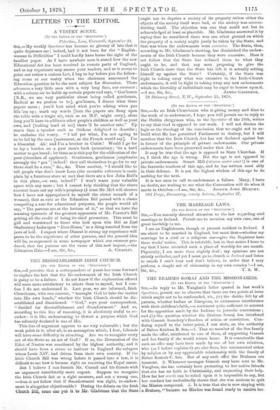THE DISESTABLISHED IRISH CHURCH.
[To THE EDITOR OF THE "SPECTATOR."] SIR, I perceive that a correspondent of yours has come forward to explain the fact that the Re-endowment of the Irish Church is going to be a failure. I do not know if the explanation offered will seem more satisfactory to others than to myself, but I con- fess I do not understand it. Last year, we are informed, Irish Churchmen, with one consent, " besought God to take the matter into His own hands," whether the Irish Church should be dis- established and disendowed. " God," says your correspondent, "decided for disestablishment and disendowment." And so, according to this line of reasoning, it is absolutely sinful to re- endow : it is like endeavouring to thwart a purpose which God has solemnly declared is one of His.
This line of argument appears to me very vulnerable ; but the weak point in it, after all, is an assumption which, I fear, Liberals will have some difficulty in attacking. Are we to recognize every act of the State as an act of God ? If so, the Revocation of the Edict of Nantes was sanctioned by the highest authority, and it should have been a crime to harboar in England the refugees whom Louis XIV. had driven from their own country. If the Irish Church Bill was wrong before it passed into a law, it is difficult to see how it became right on receiving the Royal assent.
But I believe I can furnish Mr. Carroll and his friends with an argument considerably more cogent. Suppose we recognize the Irish Church Act as a right measure, and not a wrong one, —does it not follow that if disendowment was right, re-endow- ment is altogether objectionable? During the debate on the Irish
Church Bill, some ono put it to Mx. Gladstone that the State ought not to deprive a society of its property unless either the objects of the society itself were bad, or the society was miscon- ducting itself. The objection was one that could not but be acknowledged at least as plausible. Mr. Gladstone answered it by saying that he considered there was one other ground on which the property of a society might justly be taken by the State, and that was when the endowments were excessive. The State, then, according to Mr. Gladstone's showing, has diminished the endow- ments of the Irish Church because they were excessive. Does it not follow that the State has reduced them to what they ought to be, and that any man proposing to give the Irish Church more than the State has left it is actually setting himself up against the State ? Certainly, if the State was right in taking away what was excessive in the Irish-Church endowments, it will be right in taking away any new endowments which the liberality of individuals may be eager to bestow upon it.






























 Previous page
Previous page